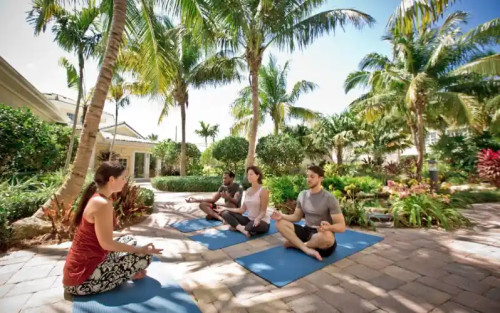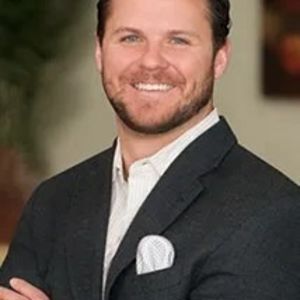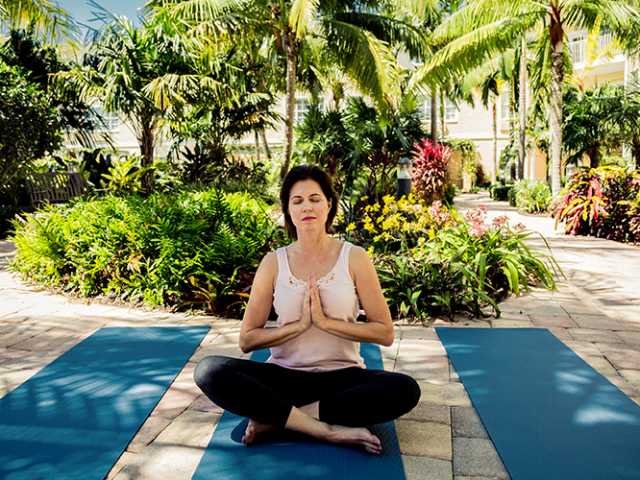






ORENDA Program at Futures Recovery Healthcare
Verified Center
This provider's information has been quality-checked by Recovery.com's Research Team for accuracy and completeness, including center verification through appropriate third-party organizations.
Treatment Focus
This center treats substance use disorders and co-occurring mental health conditions. Your treatment plan addresses each condition at once with personalized, compassionate care for comprehensive healing.
Primary Level of Care
Offering intensive care with 24/7 monitoring, residential treatment is typically 30 days and can cover multiple levels of care. Length can range from 14 to 90 days typically.
Treatment Focus
This center treats substance use disorders and co-occurring mental health conditions. Your treatment plan addresses each condition at once with personalized, compassionate care for comprehensive healing.
Primary Level of Care
Offering intensive care with 24/7 monitoring, residential treatment is typically 30 days and can cover multiple levels of care. Length can range from 14 to 90 days typically.
Private Pay
You pay directly for treatment out of pocket. This approach can offer enhanced privacy and flexibility, without involving insurance. Exact costs vary based on program and length of stay. Contact the center for specific details.
ORENDA Program at Futures Recovery Healthcare
ORENDA Program at Futures Recovery Healthcare
About ORENDA Program at Futures Recovery Healthcare
Orenda’s Concierge Luxury program facilitates recovery for individuals and families linked to a public persona, committed to high-demand occupations, or unable to remove themselves from the stressors and situations that trigger addiction. Their model of integrated care is designed to meet the needs of high performing, high profile, high achieving individuals. In addition to cutting-edge treatments, advanced testing, and a professional team of providers, Orenda allows a generous electronics policy. They also provide the ability to flex treatment times around work schedules, and sober companions to accompany clients to business meetings or social events.
Clinically Led, Customized Care
At Orenda, their goal is to deliver maximum benefit in the time clients and treatment providers have together. To accomplish this, Orenda envelops clients in a program of analysis, treatment, and wellness services informed by clinical innovation rather than insurance limitations. A wide range of world-class therapies help ensure no barriers stand between Orenda clients and clinically recommended care.
Treatment Catered to Professionals
Ordena believes succeeding in recovery often necessitates fundamental changes to lifestyle, surroundings, and relationships. Their concierge professionals program provides these services and changes for those who may feel unable to focus on recovery and succeed in their professional life. Orenda provides specialized treatment, education, and support services to help clients maintain a demanding lifestyle, their recovery, and a life-long commitment to good health. Orenda coordinates intensive medical, clinical, neurorestorative, and wellness interventions to build a strong foundation of holistic mental, physical, and spiritual well-being. Their services include brain mapping, genomic testing, transcranial magnetic stimulation (TMS), and coordinated care from Ordena’s addiction psychiatrist and 24-7 medical team.
Privacy And Luxury Accommodations
Orenda’s clients have a floor to themselves in Futures’ facility, with specific entrances and keycard access. Clients can enjoy complete privacy or use some of the facility’s amenities like their pool and recreation areas. Private rooms provide space to work, Wi-Fi, maid services, lounge areas, and an eat-in breakfast nook. Orenda’s concierge manages clients’ schedules with outside appointments, work needs, and any transportation needed. Chef-cooked meals make each day restorative on a nutritional level, and luxurious rooms give the space clients need to rest, reflect, and focus on their recovery.

Highlights from the Center
Highlights
These highlights are provided by and paid for by the center.
Perfect for Professionals
Utmost Confidentiality
Private Rooms Only
Tech Friendly
Center Overview
Treatment Focus
This center treats substance use disorders and co-occurring mental health conditions. Your treatment plan addresses each condition at once with personalized, compassionate care for comprehensive healing.
Joint Commission Accredited
The Joint Commission accreditation is a voluntary, objective process that evaluates and accredits healthcare organizations (like treatment centers) based on performance standards designed to improve quality and safety for patients. To be accredited means the treatment center has been found to meet the Commission's standards for quality and safety in patient care.
Pricing and Program Length
Estimated Center Costs
The cost listed here ($79,500 - $95,000 / 30 days), is an estimate of program cost. Center price can vary based on program and length of stay. Contact the center for more information. Recovery.com strives for price transparency so you can make an informed decision.
Luxury rehab centers offer a unique blend of luxurious amenities and high-quality treatment. From private suites to gourmet dining, personal trainers to spa treatments, these facilities provide a high level of comfort and discretion.

Meet Your Care Team

Michael Holloway
Owner, Founder, Visionary

Tammy Malloy
Chief Executive Officer
PhD, LCSW, CSAT

Dr. Gloria Dunkin
Executive Medical Director
MD

Ally Dooley
Clinical Director of Reset
LCSW, QS

Amy Effman
Family Therapist
LMFT, CAP

Terry Macho
Orenda Primary Therapist, Group Facilitator
MS, CAP, ICADC

Danara Nelson
Lead Medical and Psychiatric Provider for Orenda
MSN, APRN, NP-C, PMHNP-BC

Cheryl Clopton
Executive Concierge Case Manager
MS

Susan Silverstein-Knee
Orenda Primary Therapist
MSW, MCAP

Willa Keel
Director of Nursing
RN

Stacey LoSardo
Assistant Clinical Director of Core, Hero's, Reset, & IOP
LCSW, QS

Kate Armstrong
Chief Operating Officer
LMHC, CRRA

Angela Bustamante
Executive Clinical Director
MS, LMHC

Eija Toivonene Wood
Lead Nurse Practitioner
APRN

Casey Gildemyer
Family Support Specialist
MS, MCAP

Katie Cullen
Lead Primary Therapist
LMHC

Ian Zimmerman
Director of Alumni Services
BS, CAP

Li Zhang
Licensed Acupuncturist

Amie Davidson
Physical Therapist Assistant
PTA

Julie M. Snell
Massage Therapist
LMT, CRP




Levels of Care









Your Care Options
Specializations
Alcohol
Using alcohol as a coping mechanism, or drinking excessively throughout the week, signals an alcohol use disorder.
Chronic Pain Management
Long-term physical pain can have an affect on mental health. Without support, it can also impact your daily life and even lead to addiction.
Co-Occurring Disorders
A person with multiple mental health diagnoses, such as addiction and depression, has co-occurring disorders also called dual diagnosis.
Drug Addiction
Drug addiction is the excessive and repetitive use of substances, despite harmful consequences to a person's life, health, and relationships.
Executives
Executive treatment programs typically directly support the needs of people who manage businesses and may provide flexible schedules and office space to allow work during treatment.
Who We Treat
Executives
Executive treatment programs typically directly support the needs of people who manage businesses and may provide flexible schedules and office space to allow work during treatment.
Men and Women
Men and women attend treatment for addiction in a co-ed setting, going to therapy groups together to share experiences, struggles, and successes.
Professionals
Busy, high-ranking professionals get the personalized treatment they need with greater accommodations for work, privacy, and outside communication.
Veterans
Patients who completed active military duty receive specialized treatment focused on trauma, grief, loss, and finding a new work-life balance.
Approaches
Evidence-Based
A combination of scientifically rooted therapies and treatments make up evidence-based care, defined by their measured and proven results.
Individual Treatment
Individual care meets the needs of each patient, using personalized treatment to provide them the most relevant care and greatest chance of success.
Medical
Medical addiction treatment uses approved medications to manage withdrawals and cravings, and to treat contributing mental health conditions.
Personalized Treatment
The specific needs, histories, and conditions of individual patients receive personalized, highly relevant care throughout their recovery journey.
Wellness
Wellness philosophies focus on the physical, mental, and spiritual wellness of each patient, helping them restore purpose with natural remedies.
Therapies
1-on-1 Counseling
Patient and therapist meet 1-on-1 to work through difficult emotions and behavioral challenges in a personal, private setting.
Meditation & Mindfulness
A practiced state of mind that brings patients to the present. It allows them to become fully aware of themselves, their feelings, and the present moment.
Cryotherapy
Stepping into a chamber of extreme cold floods the bloodstream with nutrients and endorphins, helping reduce withdrawal symptoms and cravings.
Trauma-Specific Therapy
This form of talk therapy addresses any childhood trauma at the root of a patient's current diagnosis.
Rational Emotive Behavior Therapy
A type of cognitive therapy that identifies negative self-defeating thoughts and behaviors, rewriting beliefs to be positive, empowering, and present.
Transcranial Magnetic Stimulation
Localized magnetic pulses stimulate areas of the brain to increase brain activity and reduce abnormal functions.
Mindfulness Therapy
This ancient practice can be mental, emotional, and even spiritual. In meditation, you focus your attention on the present moment without judgement.
Conditions We Treat
Pornography Addiction
A person with a porn addiction is emotionally dependent on pornography to the point that it interferes with their daily life and relationships.
Schizophrenia
Schizophrenia is a serious mental health condition that causes hallucinations, delusions, and disordered thinking.
Grief and Loss
Grief is a natural reaction to loss, but severe grief can interfere with your ability to function. You can get treatment for this condition.
Personality Disorders
Personality disorders destabilize the way a person thinks, feels, and behaves. If untreated, they can undermine relationships and lead to severe distress.
ADHD, ADD
ADHD is a common mental health condition caused by dopamine imbalance. Common symptoms include inattention, hyperactivitiy, and impulsivity.
Anger
Although anger itself isn't a disorder, it can get out of hand. If this feeling interferes with your relationships and daily functioning, treatment can help.
Anxiety
Anxiety is a common mental health condition that can include excessive worry, panic attacks, physical tension, and increased blood pressure.
Bipolar
This mental health condition is characterized by extreme mood swings between depression, mania, and remission.
Burnout
Burnout entails mental and physical exhaustion, and leads to a severe lack of fulfillment. This condition is often caused by overwork.
Substances We Treat
Alcohol
Using alcohol as a coping mechanism, or drinking excessively throughout the week, signals an alcohol use disorder.
Benzodiazepines
Benzodiazepines are prescribed to treat anxiety and sleep issues. They are highly habit forming, and their abuse can cause mood changes and poor judgement.
Chronic Relapse
Consistent relapse occurs repeatedly, after partial recovery from addiction. This condition requires long-term treatment.
Co-Occurring Disorders
A person with multiple mental health diagnoses, such as addiction and depression, has co-occurring disorders also called dual diagnosis.
Cocaine
Cocaine is a stimulant with euphoric effects. Agitation, muscle ticks, psychosis, and heart issues are common symptoms of cocaine abuse.
Drug Addiction
Drug addiction is the excessive and repetitive use of substances, despite harmful consequences to a person's life, health, and relationships.
Ecstasy
Ecstasy is a stimulant that causes intense euphoria and heightened awareness. Abuse of this drug can trigger depression, insomnia, and memory problems.
Heroin
Heroin is a highly addictive and illegal opioid. It can cause insomnia, collapsed veins, heart issues, and additional mental health issues.
Psychedelics
Hallucinogenic drugs—like LSD—cause euphoria and increased sensory experiences. When abused, they can lead to depression and psychosis.
Languages
Aftercare
Care Designed for Your Needs
Personal Amenities
Amenities
Special Considerations
Clients can bring their own pet(s)
For greater comfort and healing, pet-friendly treatment centers welcome dogs and animal companions to stay with their owners while they attend treatment.
Executive Program
Addiction and mental health treatment for executives typically involves high discretion, greater technology access, and more private, 1-on-1 care.
Flexible technology policies
Centers with flexible technology policies allow professionals to stay in touch with work and give patients a greater sense of connection and normalcy.
Activities
Yoga
Yoga is both a physical and spiritual practice. It includes a flow of movement, breathing techniques, and meditation.
Off-Site Activities
Yoga
Yoga is both a physical and spiritual practice. It includes a flow of movement, breathing techniques, and meditation.
Off-Site Amenities
What people are saying
Treatment
4.4
Accommodations
4.6
Food & Nutrition
4.3
Value
4.4
Pros
- Beautiful Location (2)
- Excellent & Effective Treatment Programming (2)
- Personalized (2)
- Gourmet & Nutritious Food (2)
Kevin B
Treatment in 2022 • (90 days) • Reviewed 10/19/23
Former Client
•Business Owner
Pat
Treatment in 2023 • (45 days) • Reviewed 10/20/23
Former Client
DJL
Treatment in 2023 • (30 days) • Reviewed 10/18/23
Former Client
•Sales
Roderick
Reviewed 03/26/21
Review from Rehabs.com
Dottie
Reviewed 03/27/25
Review from Rehabs.com






